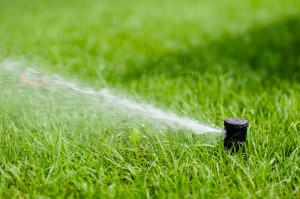Do you spend hours upon hours trying to set up your lawn sprinkler to water your scorched, ugly looking lawn? Are your flowers looking like you haven’t watered them in weeks, but in reality you have just watered them the day before? You are not alone. Keep reading about the benefits of irrigation!
There are many people throughout the local area that pose the same question. Year after year, they spend more time than they would like watering their property. Some people may think that there is no other way of doing it. Or, that a sprinkler system can only be installed in sandy, coastal areas. Any person who thinks this way is incorrect. An irrigation system can be installed almost anywhere — especially right here in central PA — and there are many benefits that come along with having an irrigation system.
How an Irrigation System Works
 Irrigation system design starts with the controller. From the controller, an electric signal is transmitted to a valve to turn on the water in a specific area of your property (like flipping a light switch). The amount of time the zone stays running after the valve turns on is determined by the time set in the controller. Each of the zones will run, one after the other, until every zone has cycled through. Run time, and amount of days to water, are all influenced by location, type of plant and time of year. All these factors need to be considered in order to make your Irrigation system perform efficiently.
Irrigation system design starts with the controller. From the controller, an electric signal is transmitted to a valve to turn on the water in a specific area of your property (like flipping a light switch). The amount of time the zone stays running after the valve turns on is determined by the time set in the controller. Each of the zones will run, one after the other, until every zone has cycled through. Run time, and amount of days to water, are all influenced by location, type of plant and time of year. All these factors need to be considered in order to make your Irrigation system perform efficiently.
Three Ways You’ll Save with an Irrigation System
1. Save Water and Prevent Overwatering
Irrigation systems can be set up so they only water when the plant needs water. Overwatering is a big concern and can be tough to tell when there is too much water on the plant. One way that an irrigation system reduces the amount of water being used is by rain sensors. A rain sensor gets installed on the property in an open area where it can collect only naturally occurring rainfall. This is typically on the eve of a rooftop. The sensor will collect the water and tells the controller when to shut off due to rainfall.
Another way that having an irrigation system helps reduce water consumption is based on the design of your sprinkler system. Placing the proper sprinkler heads in the right location is critical. This way, they do not overlap too much or too little. Having an irrigation professional put together a design is the best option to making sure you have proper sprinkler head placement for the water psi coming out on your property.
2. Save Money on the Cost of Water
Most people might think that when you install an irrigation system, you will be spending a lot more money on water to give everything on your property what it needs. That is not the case. When comparing hand watering to an efficient irrigation system, the system will save you money every time. Sprinklers are set up to give water directly to the plant, which will reduce water wasting through excess runoff and evaporation.
3. Save Time with Precise Watering
Every plant in your landscape needs water, some more than others. Without the proper amount of water, the plant will struggle to survive. Hand watering flowers and plants has been a practice that’s always been done, and is still an effective means of providing water. When you start increasing the size of your property, the longer it will take to water everything correctly. With a properly installed irrigation system, your lawn and plant material will look better than ever, and you no longer need to worry about spending time to water.
An Irrigation System Makes Lawn Maintenance Easier
Besides saving water, money, and time, why wouldn’t you want to have a sprinkler system installed on your property? The many benefits of irrigation tell a great story as to why more and more people are moving towards the installation of one. You will be drastically increasing the appearance of your property, as well as making a great investment towards the value of your home.
If you would like to talk about how we can help transform your property in Lancaster, Lebanon, York, Berks or Dauphin counties, please don’t hesitate to contact us by calling (717) 399-1991 or using our online form.

